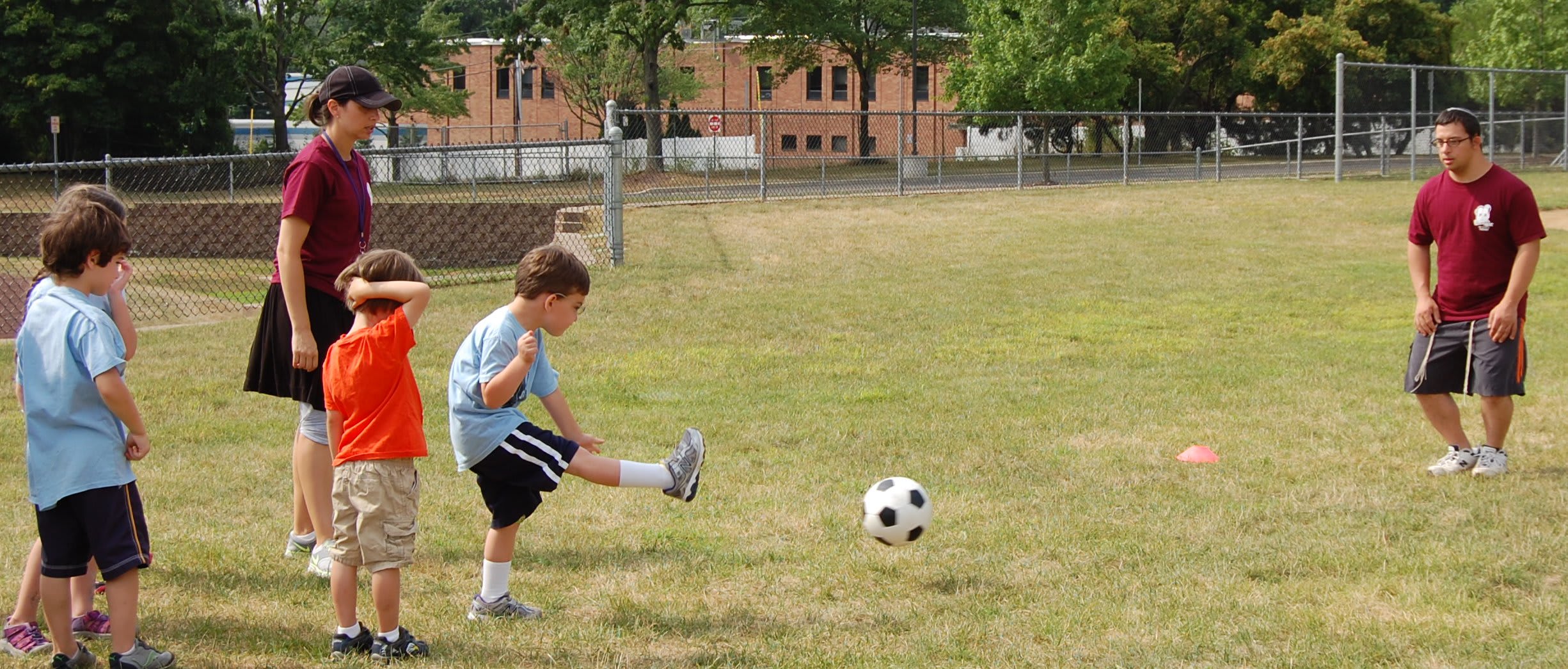Even adults love the opportunity to spend a day at camp — it doesn’t matter if it’s sleep-away or day camp. Imagine my excitement to change my regular daily routine, consisting of an hour-and-a-half each way commute to a brick building in Manhattan, for one day at camp.
My recent visit at Yachad’s first-ever vocational day camp program, hosted at Moshava Ba’ir (Moshava in the City) in Paramus, NJ, involved me within the world of Yachad Inclusion as a major example of how Yachad does its wonderful work: designing a full regimen of responsible staff level activities that allow individuals to develop their social, professional, and life goals. And of course, all of this is provided within an enjoyable setting and with a full dose of Jewish pride.
Moshava Ba’ir is a popular program of the Bnei Akiva Religious Zionist youth movement, one of whose major initiatives involves community building.
An agency of the Orthodox Union, Yachad/The National Jewish Council for Disabilities (NJCD), is a non-profit organization dedicated to enhancing the opportunities of individuals with disabilities, promoting Inclusion through various integrated activities and ensuring their participation in the full spectrum of Jewish life.
“Everyone who has a disability has abilities,” emphasized Dr. Jeffrey Lichtman, National Director of Yachad. “Perhaps Yachad’s greatest area of challenge is helping the community to look beyond the disability, to the person and their individual abilities. Yachad’s growing partnership with Bnei Akiva and Moshava camps across North America is so gratifying and encouraging because they really do get it — they value each camper and vocational worker regardless of disability. Like Yachad, they believe in the ability of every individual. That’s what Inclusion is all about.”
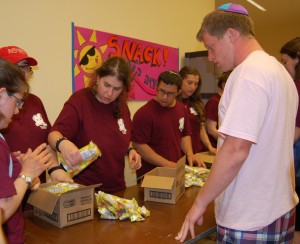
taking orders from bunk representatives.
My particular visiting day found me meeting six participants in the vocational program, on one of the busier days of the week. Twice a week, Ellen, Devorah, and Nechama travel from Flatbush to work at the camp. Three others from New Jersey — Avi from Englewood, Annette from Fort Lee, and Dorit from Elizabeth — were at camp Monday through Friday. These vocational workers (known around campus as the “Voc workers”) had been hired to work alongside regular staff members in all areas of camp life, among them: office work; kitchen and cafeteria staff; running the snack counter; and assisting within specialty fields such as arts and crafts, dance, cooking and baking, and sports.
I was warmly greeted by Ariella Silver, Director of the Yachad Vocational Program. Every morning, she arrives early to get the camp schedule, where the children in attendance range from age five through 11, in order to customize schedules for each Voc worker based upon interests and strengths.
Ariella explained to me that each Voc worker determines three personal and professional goals they wish to further develop through participation in the program. Overwhelmingly, the Voc workers at Moshava Ba’ir are high functioning individuals with disabilities that were not always obvious to the eye.
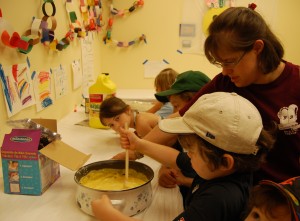
Before camp began in early July, Ariella personally interviewed each participant to address these goals. I learned that these goals could range from social skills (such as increased eye contact, increased social interaction, increased self-advocacy), to hygienic goals (such as dressing professionally and not constantly touching hair), to professional goals (such as time management, understanding and giving directions, and being “work ready”).
“Yachad does a very thoughtful job to make sure the Voc workers are gaining broad life skills,” noted Dr. Joe Goldfarb, Yachad National Director of Summer Programs. “The goal of Yachad is Inclusion, and what follows is that it is critical for our vocational workers in camps to hold jobs that have real responsibilities; that they contribute to camp functioning in a similar way to staff who do not have special needs. A person having a job makes them feel accomplished, and that they are contributing meaningfully to society. Completing a job in a positive fashion provides Yachad participants with a sense of satisfaction and pride.”
That in mind, Ariella emphasized that the Voc workers purposely don’t wear Yachad shirts to stand out because they are considered staff. This includes wearing Moshava Ba’ir staff shirts, hanging out in the staff lounge, and if they function independently, working without a job coach directly supervising in the room.
Rabbi Menachem Hecht, Director of Moshava Bair, stated:
One of the core values of Moshava Ba’ir as a Bnei Akiva program is connecting to community and building community. This makes having a Yachad vocational program at camp a natural fit — it gives us a unique opportunity to build a really warm and inclusive community. The Voc workers and job coaches are organized, friendly, and continue finding ways to be part of the camp community. Ariella is terrific, and Joe Goldfarb and Nechama Braun of Yachad’s national office have really helped to create a smooth beginning to our partnership.
More than acting as a structured day of work, the Yachad program allows the interests and personalities of the Voc workers to really shine.
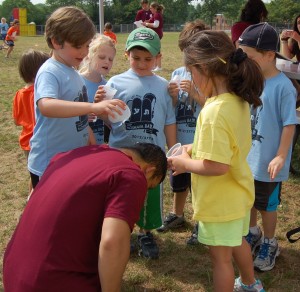
Despite the summer heat, I was eager to get outdoors for Avi’s sports session. From the moment the 10 five-year-old boys and girls saw him, their little arms wouldn’t stop waving and their little mouths wouldn’t stop exclaiming his name: “Avi! Avi! Hi Avi!” With his warm, friendly demeanor, it was obvious to me that Avi, 28, loved working with the campers. After leading stretches and various games with the soccer ball, Avi served as a goalie and raised the challenge that any camper who could kick the ball past him could pour a cup of water over his head. Oh, did I laugh at the thought! But Avi was sincere, and oh boy, were those kids serious. Overall, six cups of water were poured over his head. Who had more fun – Avi or the bunk? I don’t know.
Taking a break from the heat, I was introduced to Annette, 35, who spent her mornings in the dance classes. I met Annette tying colorful capes for a bunk of six-year-old girls before they “flew” to a spot to make a circle. Annette, who has a Master’s Degree in Molecular Biology, shared with me that a passion of hers is Zumba (an exercise class combining various dance styles), so her morning routines were a great fit. “I try to encourage the kids to focus on the activity, which could be line dancing, Israeli folk dancing or Zumba,” she tells me. “The girls are very sweet and I help them to enjoy.”
[159.JPG]
Twice that day I joined the Voc workers as they managed the camp’s snack station. Once, when the ice pops ran out before the line of eager campers, I was so impressed as Avi — always with a smile — reassured everyone that they were getting more. “How do you stay so calm?” I asked. His response? “Patience is key.”
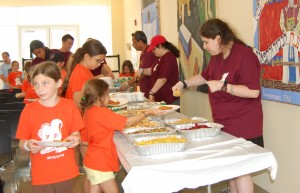
As Dorit, 22, set lunch tables with water pitchers and cups, she told me that she looked forward to the second shift of lunch because that was when she could socialize the most with the kids. While most of the Voc workers and coaches ate lunch together in the staff section, Ariella was beaming to point out how Avi sits with the teen boys hired to do “plugah,” Hebrew for work maintenance, since he’s just one of the guys.
Walking down the hallway, I couldn’t resist popping my nose into the baking room, where “Buried Treasure Brownies” were the treat of the day. “My favorite activity is baking, because of the delicious smells,” eagerly shared Nechama with a grin. Across the hall I was treated to the aromas of cooking spicy rice. Nechama assisted the campers to measure and mix ingredients; give instructions; and to set up and clean baking supplies.
The comraderie between the Voc workers was warm and palpable. The day of my visit happened to be
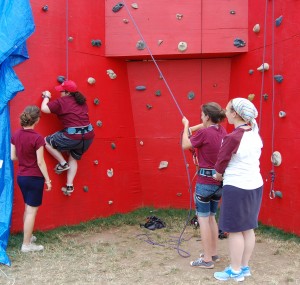
Avi’s last day, as he was leaving shortly to participate on Yachad’s five-week touring program of Israel, Yad B’Yad. Munching on kosher Dunkin Donuts, I was moved as each person took a turn sharing well wishes and pleasant memories with Avi. Later in the afternoon, I fully saw the friendships of the Voc workers in action during a free period specifically designated for team-building. Cheering each other on, they were strapped up and took turns climbing a rock wall — not an easy feat even for myself. Some became nervous of the heights, others felt physically unable to continue all the way to the top, but they were all met with roaring cheers from the first step until the last, and with rounds of high-fives upon reuniting with the group.
Equipped with my camera and notebook, and a healthy layer of sunscreen, my day at camp was fun and delicious. But more than the swimming and tennis, or Israeli culture workshops and baking projects, or arts and crafts and dancing, my day at camp was so enjoyable thanks to a team of individuals – bright, friendly, and enthusiastic – who showed me the very meaning of Yachad Inclusion.
You can also promote inclusion: Sponsor or run with Team Yachad at this year’s ING Miami Marathon and Half-Marathon. Get inspired by people who already did.
Batya Rosner is Assistant Director of Public Relations for the Orthodox Union.
The words of this author reflect his/her own opinions and do not necessarily represent the official position of the Orthodox Union.

